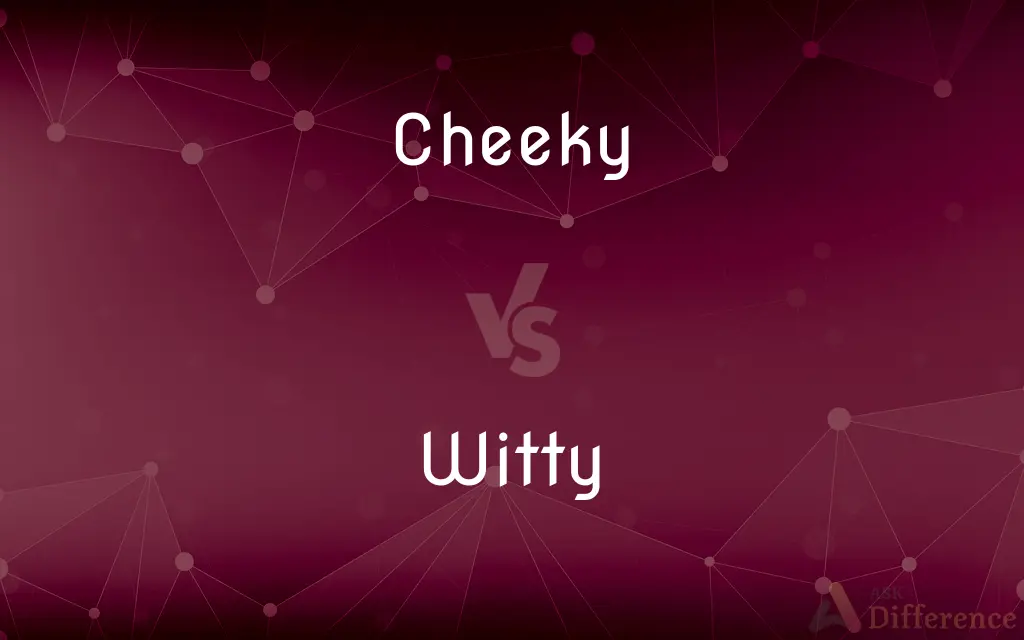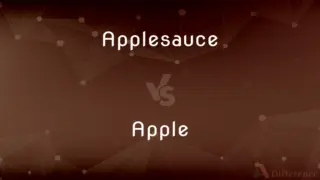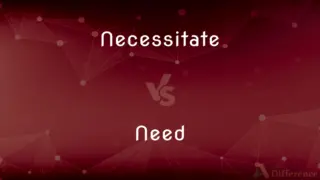Cheeky vs. Witty — What's the Difference?
By Urooj Arif & Fiza Rafique — Updated on March 29, 2024
Cheeky involves bold or impudent behavior, often playful, while witty implies clever humor or intelligence in remarks.

Difference Between Cheeky and Witty
Table of Contents
ADVERTISEMENT
Key Differences
Cheekiness often characterizes a person's bold, impudent behavior, which can be perceived as endearingly insolent or inappropriately disrespectful, depending on the context. This attribute is generally associated with a playful or irreverent attitude towards authority or conventional norms. Witty, in contrast, describes a person's ability to deliver clever, quick, and often humorous responses that demonstrate verbal intelligence and mental sharpness. Wit involves the use of language to evoke laughter or admiration through insightful observations or clever remarks.
While cheeky behavior might include playful acts or comments that challenge social boundaries, wit requires a certain level of intelligence and quick thinking to make astute observations or connections that others find amusing or enlightening. For instance, a cheeky child might make a funny face behind a teacher's back, whereas a witty individual could cleverly diffuse a tense situation with a humorous comment.
Cheekiness can sometimes be misinterpreted as rudeness or lack of respect, especially if the audience does not perceive the playful intent behind the behavior. Wit, however, is generally admired and viewed as a sign of intellectual agility and creativity, although it too can be used sarcastically or cuttingly in a manner that might offend.
In social interactions, cheeky individuals are often appreciated for their ability to lighten the mood with their playful defiance of norms, making them popular in informal settings. Witty people, on the other hand, are valued for their engaging conversation and the depth of their insights, making them compelling company in both casual and more formal gatherings.
Despite their differences, both cheekiness and wit contribute to the dynamism of human interaction, adding a layer of complexity to how individuals express themselves and connect with others. Cheeky behavior adds an element of spontaneity and rebellion, while wit offers intellectual stimulation and entertainment.
ADVERTISEMENT
Comparison Chart
Definition
Bold or impudent behavior, often playful.
Clever humor or intelligence in remarks.
Key Characteristics
Playfulness, irreverence, boldness.
Intelligence, humor, quick thinking.
Social Perception
Can be seen as endearing or disrespectful.
Generally admired for cleverness and insight.
Context
Often informal, challenging social norms.
Can be both casual and formal, showcasing intellect.
Potential Misuse
Might be perceived as rudeness if misunderstood.
Could offend if used sarcastically or harshly.
Compare with Definitions
Cheeky
Sometimes pushing the limits of respectfulness.
The cheeky remark to the teacher bordered on disrespectful.
Witty
Reflecting a sophisticated understanding of language and concepts.
The author's witty prose delighted readers with its clever wordplay.
Cheeky
Displaying boldness or impudence in a playful manner.
His cheeky grin after pulling a prank lightened the mood.
Witty
Capable of engaging others with intelligent humor and banter.
The speaker's witty repartee made the lecture both informative and entertaining.
Cheeky
Tending to speak or act in a way that disregards conventional boundaries.
Her cheeky comments during meetings always elicited laughs.
Witty
Often implying a certain elegance or refinement in humor.
The playwright's wit shone through in the clever dialogue and subtle humor.
Cheeky
Characterized by a jovial and irreverent attitude.
The mascot's cheeky antics entertained the crowd.
Witty
Involving sharp intelligence and an ability to make astute observations.
His witty observations about everyday life were both hilarious and insightful.
Cheeky
Often associated with a lighthearted defiance of norms.
Wearing a bright, unconventional outfit to the solemn event was a cheeky move.
Witty
Demonstrating cleverness and quick thinking in humor.
Her witty comeback left everyone laughing.
Cheeky
Impertinently bold; impudent and saucy.
Witty
Showing or characterized by quick and inventive verbal humour
Marlowe was charming and witty
A witty remark
Cheeky
(informal) Impudent; impertinent; impertinently bold, often in a way that is regarded as endearing or amusing.
Witty
Demonstrating wit in expression, especially in speech or writing; clever and humorous
A witty commentator on the political scene.
Cheeky
Tending to expose the cheeks of the buttocks.
Witty
Characterized by or having the nature of wit; funny or jocular
A witty saying.
Cheeky
(Australian Aboriginal) Poisonous (of animals such as snakes), dangerous, cunning, violent, potent.
Witty
Entertainingly and strikingly clever or original in concept, design, or performance
A witty sculpture.
Witty choreography.
Cheeky
Indulged in.
Witty
(obsolete) Wise, having good judgement.
Cheeky
A Brazen-faced; impudent; bold.
Witty
(archaic) Possessing a strong intellect or intellectual capacity; intelligent, skilful, ingenious.
Cheeky
Offensively bold;
A brash newcomer disputed the age-old rules for admission to the club
A nervy thing to say
Witty
Clever; amusingly ingenious.
His speech was both witty and informative.
Witty
Full of wit.
His frequent quips mark him as particularly witty.
Witty
Quick of mind; insightful; in possession of wits.
She may have grown older, but she has grown no less witty.
Witty
Possessed of wit; knowing; wise; skillful; judicious; clever; cunning.
Witty
Especially, possessing wit or humor; good at repartee; droll; facetious; sometimes, sarcastic; as, a witty remark, poem, and the like.
Witty
Combining clever conception and facetious expression;
His sermons were unpredictably witty and satirical as well as eloquent
Common Curiosities
What makes someone cheeky?
Someone is cheeky if they exhibit bold or playful impudence, often challenging norms in a light-hearted way.
Can cheekiness be considered a form of wit?
While cheekiness can be clever, it's more about boldness and playfulness than the intellectual humor typical of wit.
How is wit perceived in social settings?
Wit is generally admired in social settings for its ability to engage, entertain, and offer sharp insights in a humorous way.
What characterizes witty humor?
Witty humor is characterized by clever, quick thinking that combines intelligence with humor to make insightful or amusing remarks.
Is it possible to be both cheeky and witty?
Yes, an individual can display both qualities, using boldness and cleverness to navigate social interactions in a playful and intellectually engaging manner.
How can witty remarks be misused?
Witty remarks can be misused when they are overly sarcastic, cutting, or used at someone's expense, potentially causing offense.
What are the risks of being too cheeky?
Being too cheeky risks offending or disrespecting others if the playful intent is not clear or if it crosses boundaries of appropriateness.
What's the role of context in determining whether behavior is cheeky or witty?
Context plays a crucial role; what's considered cheeky in one setting may be seen as witty in another, depending on social norms and the audience's expectations.
Can cheekiness be a strategic social tool?
Yes, cheekiness can be used strategically to challenge norms, break the ice, or add spontaneity to interactions, fostering a relaxed environment.
How do cultural differences affect perceptions of cheekiness and wit?
Cultural differences greatly affect how cheekiness and wit are perceived, with some cultures valuing directness and playfulness more than others, which may interpret these traits differently.
Share Your Discovery

Previous Comparison
Applesauce vs. Apple
Next Comparison
Necessitate vs. NeedAuthor Spotlight
Written by
Urooj ArifUrooj is a skilled content writer at Ask Difference, known for her exceptional ability to simplify complex topics into engaging and informative content. With a passion for research and a flair for clear, concise writing, she consistently delivers articles that resonate with our diverse audience.
Co-written by
Fiza RafiqueFiza Rafique is a skilled content writer at AskDifference.com, where she meticulously refines and enhances written pieces. Drawing from her vast editorial expertise, Fiza ensures clarity, accuracy, and precision in every article. Passionate about language, she continually seeks to elevate the quality of content for readers worldwide.















































